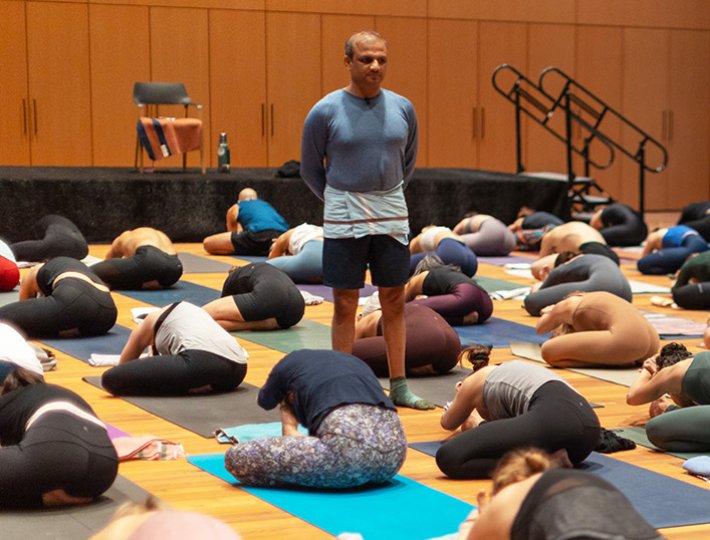With all that’s happening in our country and around the world, the need to strengthen our capacity for empathy is more essential than ever. A recent study from the University of Sussex in the UK found that a simple loving-kindness meditation, also called metta meditation, could have a profound impact on perception and racial bias, while increasing one’s overall sense of well-being and positivity.
The research from Sussex shows that the act of loving-kindness meditation not only benefits our physical or mental health, but could also permeate society as a whole. In the study, a non-meditating group of white individuals were taught loving-kindness meditation and were asked to direct their practice toward a gender-matched black individual. Post-practice, test subjects were assessed and scored based on the Implicit Association Test, which measures positive and negative association. Typically, individuals project positive association more strongly to their own ethnicity, but following the seven-minute loving-kindness meditation, positive associations and “other-regarding” emotions were more prevalent, signifying the reduction of racial bias. “This indicates that some meditation techniques are about much more than feeling good,” explained Alexander Stell, lead researcher in the study, “and might be an important tool for enhancing inter-group harmony.”
The practice of loving-kindness meditation consists of conscious, contemplative self-compassion that progresses to awareness and empathy extended to those around you. This process of emanating well wishes to oneself and others can promote warm feelings of affection, connection, and community.
Sharon Salzberg, New York Times best-selling author and world-famous Buddhist teacher, has long touted the profound benefits of metta meditation. “The practice of loving-kindness allows us to see the interconnectedness that’s actually there,” she says. “We’re not trying to make it up—it’s how the world is in reality. And the more we see this, the more compassion becomes our natural response.” Viewed through this lens, loving-kindness, by increasing our capacity for compassionate awareness of others, can deeply impact social consciousness.
Noah Levine, author of Dharma Punx: A Memoir and Against the Stream, and a prominent American Buddhist, teaches loving-kindness meditation around the country. “Loving-kindness helps us heal the inner wounds that lead to all forms of bias and oppression,” he says. “From the inside out, we become kind and compassionate.” This practice, based on altruistic notions of kindness and ego-dissolution, can give rise to a sense of belonging. This space of interconnectedness is one of healing, joy, and, ultimately, connection. It is in the connection that we let go of predetermined notions about individuals—judgment, stereotypes, and clichés—and embrace one another as a part of the whole.
Instructions for Loving-Kindness Meditation
Read on and follow the instructions below or watch the video to experience a 10-minute guided loving-kindness meditation practice
.Sit in a comfortable and relaxed manner. Take a few deep breaths with slow, long inhalations and exhalations. Let go of any concerns from the day. Imagine the breath moving through your body, specifically illuminating the area of your heart.
It is important to first practice loving-kindness toward oneself, since self-love necessitates the care of others. Sitting quietly, mentally state the following:
May I feel safe and protected,
May I feel contented and pleased,
May my body support me with strength,
May my life unfold smoothly and with ease.
As you say these phrases, allow yourself to sink into the intention. Loving-kindness meditation is about connecting to the intention of wishing others or ourselves well-being and contentment. If feelings of friendliness, kindness, or love arise, connect to these emotions, allowing them to permeate your consciousness.
During meditation, one might start to experience discomfort or feelings of anger, grief, or negativity. This is natural. Don’t lose heart. “See if you can return to the contemplation without guilt or judgment. The heart of skillful meditation is the ability to let go and begin again, over and over,” notes Salzberg in her book Loving-Kindness: The Revolutionary Art of Happiness.
After directing the loving-kindness toward yourself, bring to mind a friend or someone in your life who has deeply cared for you. Then slowly repeat phrases of loving-kindness toward them:
May you feel safe and protected,
May you feel contented and pleased,
May your body support me with strength,
May your life unfold smoothly and with ease.
As you say these phrases, again sink into the intention and heartfelt meaning. Connect to the practice to reap the full benefits.
As you continue the meditation, you can bring to mind other friends, acquaintances, strangers, and also people with whom you might have difficulty. The benefits of this practice will radiate to those around you.









Comments (0)